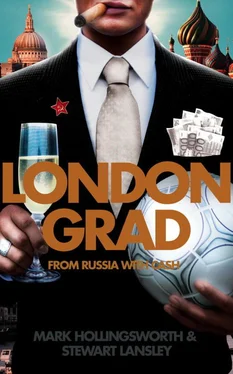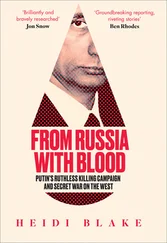1 ...7 8 9 11 12 13 ...103 In relation to that waiting list, Russians have a joke about the long delays of the period. Vladimir has been waiting for six years to buy his own car, when he is suddenly summoned to the local ministry office. ‘I have good news for you,’ says the clerk. ‘Your car will be delivered to you in five years from today.’
‘Wonderful,’ says Vladimir. ‘Will it come in the morning or the afternoon?’
‘Why, what difference does it make?’ responds the perplexed clerk.
‘Well,’ answers Vladimir, ‘I have already arranged for a plumber to come that morning.’
The dealership chain was created at a time when the automobile industry was rife with organized crime and protection rackets. Berezovsky’s Moscow dealership was targeted by Chechen gangs, which also controlled the production lines at AvtoVaz. Berezovsky, at times personally a target of the gangs, has always denied any mafia connection. In September 1993 his LogoVaz car parks were attacked three times and his showrooms bombed with grenades. When his Mercedes 600 sedan was blown up nine months later, with Berezovsky in the back and his chauffeur killed, LogoVaz issued a statement blaming ‘forces in society that are actively trying, by barbarically criminal means, to keep civilian entrepreneurship from developing in this country.’
I can tell you right here and now that not a single oligarch has bowed to the Mafia. Oligarchs themselves are stronger than any mafia, and stronger than the government, to which they have also refused to bow. If we are talking of the visible tip of the iceberg, not the part of the iceberg concealed behind the surface or in the dark, I haven’t bowed to the government either. [7] 7WPS Monitoring Agency, July 2002.
By 1993 Berezovsky had already built an extensive business empire. One of his new enterprises was the All-Russian Automobile Alliance. Owned by various companies but headed by Berezovsky, ARAA promised the production of a ‘people’s car’, to be produced by AvtoVaz in collaboration with General Motors in the United States. On the back of a huge advertising campaign, it offered bonds in the scheme and the promise of cheaper cars, cash redemption, and a free lottery once the new production line was up and running. Wooed by the ‘get-rich-quick’ promise, more than 100,000 Russians bought $50 million of shares in the project. But when General Motors backed out of the scheme and it collapsed, thousands lost their money.
By now Berezovsky had acquired a younger, second wife, Galina Becharova. They lived together for several years before being married at a civil ceremony in Russia in 1991. They had a son, Artem, and a daughter, Anastasia. Although they separated three years later, they never divorced. Berezovsky sent his two daughters from his first marriage – Elizaveta and Ekaterina – to Cambridge University.
By 1995 AvtoVaz had terminated the LogoVaz contract. The ambitious oligarch turned his attention from cars to planes, lobbying to install his business associates in key managerial positions in the state-owned airline, Aeroflot. Thanks to his growing influence at the Kremlin, he ensured that two of his intermediary companies based in Switzerland – Andava and Forus – provided Aeroflot with financial services. This gave Berezovsky huge influence over the company.
Much of Berezovsky’s business ascendancy was based on his Kremlin connections and personal friendship with President Yeltsin. Since coming to power as Russia’s first democratically elected leader following his resistance against the hardliners’ putsch of 1991 (it had toppled Gorbachev and was bent on restoring a Soviet-style dictatorship), Yeltsin seemed to relax. But gradually he became increasingly impatient, drank more, and appeared ever vulnerable to the solicitations of sycophants and businessmen, especially as he distrusted the old KGB machine.
Berezovsky’s relationship with Yeltsin was cemented by his shrewd offer to finance the publication of the President’s second volume of memoirs, Notes of a President , in 1994, arranging for royalties to be paid into a Barclays bank account in London. According to one account, before long, the President was complaining that the royalties were too low. ‘They [the ghostwriter, Valentin Yumashev, and Berezovsky] understood that they had to fix their mistake,’ claimed General Aleksandr Korzhakov, former KGB officer and Yeltsin’s closest friend and one-time bodyguard. ‘They started filling Yeltsin’s personal bank account in London, explaining that this was income from the book. By the end of 1994, Yeltsin’s account already had a balance of about $3 million.’ [8] Paul Klebnikov, Godfather of the Kremlin , Harcourt, 2000, p. 118.
A grateful Yeltsin ensured that Berezovsky became part of the Kremlin inner circle. Already a multi-millionaire, he was now well placed to benefit from the next wave of state sell-offs. In December 1994 Yeltsin signed a decree that handed over a 49 per cent stake in ORT, the main state-owned television station and broadcaster of Channel One, primarily to Berezovsky, without the auction required by law. The remaining 51 per cent remained in state hands. Berezovsky paid a mere $320,000 for the station. As most Russians get their news from the television, this also provided Berezovsky with a vital propaganda base for dealing with the Kremlin.
But perhaps Berezovsky’s biggest prize was in oil. In December 1995 he acquired a claim, via the ‘loans for shares’ scheme, to the state-owned oil conglomerate Sibneft (Siberian Oil) – then Russia’s sixth-largest oil company – for a cut price of $100 million, a tiny fraction of its true value. The deal was done with two associates. One was his closest business partner, the ruthlessly sharp Arkady ‘Badri’ Patarkatsishvili, the other was the then unknown Roman Abramovich, twenty years younger than Berezovsky but canny enough to find $50 million for a 50 per cent stake. It was from this moment that Abramovich, at first under his mentor’s tutelage but then through his own business acumen, manipulated his way to a billion dollar fortune founded on cunning negotiating skills and political patronage. It was a relationship that Berezovsky would later bitterly regret.
If there is a key to Abramovich’s relentless drive, it is the orphan in him. He was born in 1966 to Irena and Arkady, Jewish Ukrainians living in Syktyvkar, the forbidding capital of the Komi republic in northern Siberia. He lost both parents before the age of three: his mother died of blood poisoning following an abortion and his father was felled by an errant crane on a building site. Roman was adopted by his Uncle Leib and his wife Ludmilla, a former beauty queen. The family lived in the industrial city of Ukhta, where Leib was responsible for the supply of essentials to the state-owned timber business. Roman enjoyed a relatively comfortable upbringing and was, it is said, the first boy in his area to have a modern cassette player.
In 1974 Roman moved to Moscow and lived with his uncle Abram, a construction boss, who would become his surrogate father. Although they lived in a tiny two-room apartment, it lay in the heart of the capital on Tsvetnoi Boulevard, just across from the Central Market and the Moscow Circus. The young Roman did not excel at school and in 1983 was called up for national service in the Red Army and posted to an artillery unit in Kirzach, 50 miles north-east of Moscow.
On his return to the big city, Abramovich was guided and protected by his uncle in the ways of the grey market economy of perestroika . It was not unusual for ordinary Russians to indulge in smuggling and black marketeering and, despite his shyness, the young Abramovich did not hold back. He had honed his skill in the army. ‘Roman was head and shoulders above the rest when it comes to entrepreneurship,’ recalled Nikolai Panteleimonov, a former army friend. ‘He could make money out of thin air.’
Читать дальше
Конец ознакомительного отрывка
Купить книгу












